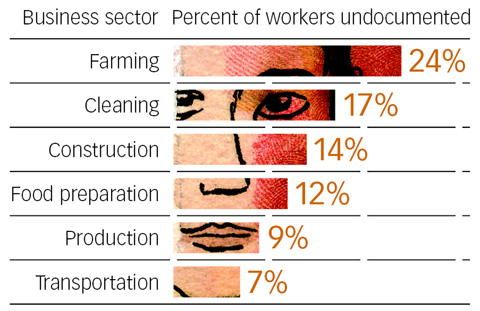A Touchy Subject More than half—56 percent—of the respondents to BUILDER’s survey said they favor a “guest worker” program that would properly document immigrant labor so they could stay in the country and pay taxes. (This is also the position of the NAHB, according to its CEO, Jerry Howard.) But while there is almost universal agreement about how industrious and reliable most immigrant workers are, builders and contractors are sharply divided about the competitive and even ethical implications of hiring illegal immigrants. A sizable percentage of those respondents don’t accept the premise that there aren’t enough legal workers to fill construction jobs, and insist that the low wages undocumented workers are being paid push American-born and legal workers out of the construction field. Several builders and contractors also adamantly oppose granting “amnesty” or an eventual path to citizenship to workers who broke the country’s laws in the first place to get here.
Butts says he hears “mixed feelings” from the pro dealers he speaks with about hiring subs that use undocumented workers. And there’s little question that this is a hot potato for some companies, as some dealers with robust installation businesses either declined interview requests or didn’t return phone calls, as did 12 of the country’s largest home builders. In a statement it e-mailed to PROSALES, The Home Depot—which generated an estimated $5 billion in installed sales in 2005 and uses a combination of captive and outside subcontractors—would say only that it “requires its contractors to comply with all federal and state employment laws, including all immigration laws. As a matter of corporate policy, The Home Depot does not employ undocumented workers.” The BMC Construction (now SelectBuild) division of Building Materials Holding Corp. stated by e-mail that it “requires all employees to provide appropriate documentation that they are eligible to work in the United States.”
Other pro dealers admit they haven’t given much thought to this issue because they aren’t seeing immigrant workers in large numbers in construction jobs yet. “As far as our business is concerned, migrant workers haven’t really entered our workforce,” says James Garner, human resources manager for New Bern Building Supply in North Carolina, a state that, from 1990 to 2005, saw its foreign-born population rise by nearly 400 percent, according to estimates by University of Michigan professor William Frey, who recently analyzed immigrant growth patterns in a paper he wrote for the Brookings Institution. Yoshida at Alpine Lumber and Wright at Cox Lumber also say immigrant workers aren’t big factors in their markets’ labor pools, even though Florida and Colorado rank third and 14th, respectively, in foreign-born population, according to Frey’s estimates.
Paper Chase It will be a certainty that in the future dealers that hire installers themselves or use subcontractors for installation services are going to be required to prove the legal status of those workers. “Builders don’t want to deal with this,” says Wright of Cox Lumber, and they will continue to depend on companies like Cox to make sure jobsite workers are legal. However, most dealers and builders admit that they don’t have the expertise to evaluate whether an employee’s documentation—such as a driver’s license, social security card, or birth certificate—is real or fake, especially when forgers “have taken this to an art form,” says one dealer’s human resources vice president. More to the point, dealers and builders say they don’t want to be put into the position of becoming the “police.”
Right now, everything is up in the air because Congress, at press time, was at an impasse on reforming existing immigration policies to strengthen the country’s borders without causing major disruptions in industries that use immigrant workers extensively. There is, however, a growing consensus among the public and the politicians that employers are flaunting workplace laws and that more rigorous employee verification is needed. Pew polled 2,000 adults in April, and more than three-quarters said they favor some kind of national ID card. Two-thirds of those polled by Pew also favor the creation of a national employee database.
To that end, more dealers might eventually find themselves registering with the federal “Basic Pilot” program, which has been around since 1996 and is run by the Department of Homeland Security and the Social Security Administration. Within three days of hiring someone, employers enter the worker’s information—social security number, address, driver’s license, etc.—into Basic Pilot’s database, which flags discrepancies with existing records. Employers in the program agree to fire anyone this system doesn’t confirm.



